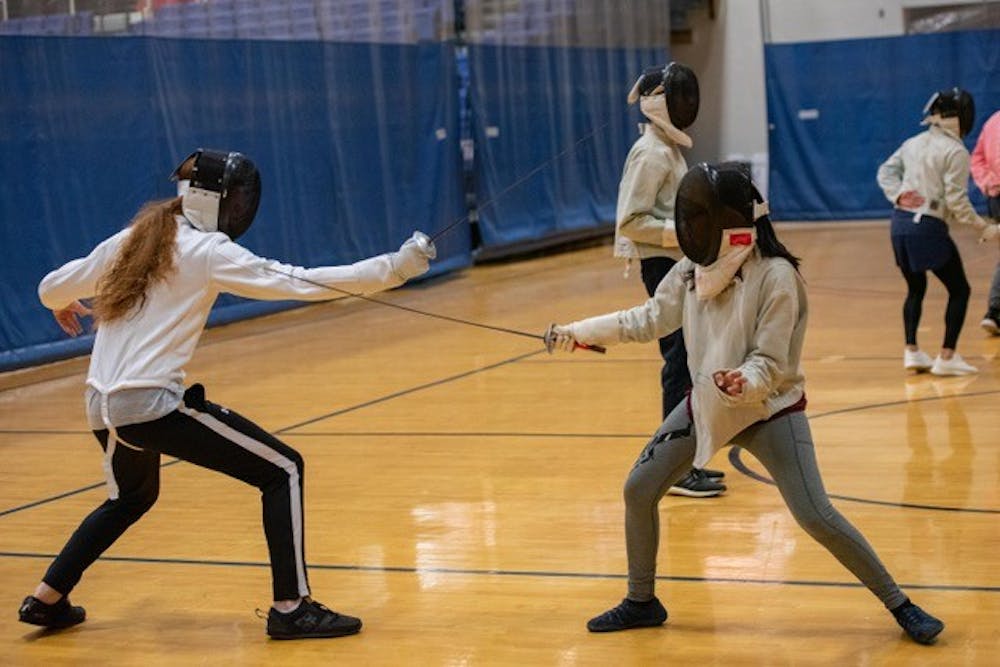With 19 options to choose from ranging from fencing to scuba diving, AU’s health and fitness courses provide a variety of options for busy students to stay active—without having to hit the gym every day.
Health and fitness courses, also known as HFIT courses, have steadily gained popularity on AU’s campus over the past three years. HFIT enrollment has increased by 13 percent since the spring of 2017, according to AU’s Department of Health Studies. Ian Poquet, senior administrator in the Department of Health Studies, wants this upward trend to continue.
“We could do more if all students knew about them,” Poquet said.
The most popular HFIT course is yoga, Poquet said. So far, six sections of yoga will be offered in the fall of 2019. More class sections are added as they reach capacity, Poquet said.
Poquet said that HFIT courses are important for students’ stress relief and overall emotional health, while providing students with the extra benefit of earning class credit.
“A class of yoga twice a week actually helps you be more stable and be in a better mood,” Poquet said.
Sophomore Johan Donayre saw the benefits of HFIT courses firsthand when he enrolled in Beginning Golf in the spring of 2019 to offset the three science labs he is taking. Even though he had no prior golf experience, he said he’s learned new techniques. The main issue he had was the class constraints due to limited space.
“We’re very limited in what we can do,” Donayre said. He added that a lack of space can sometimes prohibit students from hitting balls too far, especially when class was held indoors for the first half of the semester.
Still, Donayre said that everyone in his class has fun, and his experience has been mostly positive. He’s made a lot of personal progress, he said.
“I like seeing the ball go up,” Donayre said, “I’ve never hit it like that before.”
Rivka Grossinger, a junior, took Thai Boxing and Conditioning in the spring of 2017. Although everyone in their class had a different skill level, their professor was good at pairing people so they were matched ability-wise. They said they liked the philosophies of the class such as “fighting fair” and “using force for good.”
Rose Kehoe is an adjunct professor in the Department of Health Studies, and the instructor of the Aquatic Fitness HFIT course. She explained that Aquatic Fitness allows her to see students’ work ethics in a different way, since it is not a traditional academic class. She said she likes how her class breaks the stereotype of old ladies being the only ones who participate in aquatic fitness.
Kehoe incorporates land and water exercises in the course workouts. Students use equipment such as fins, kickboards, bands for resistance training and medicine balls to complete workouts. Since “not everyone’s a swimmer,” Kehoe said she gives students the ability to modify workouts so that they can still participate.
She also sees a future where the University could hold underwater cycling classes. To do this, the department would need to invest in new equipment, Kehoe said.
In Urban Hiking, a course taught by instructor Elizabeth Brandley, students explore trails all throughout D.C. Her goal is for students to see a different side of the District through her course. She said that students often don’t know most of the trails that exist prior to enrolling.
“My goal is to not only have them gain the unique benefit of Washington, D.C. where you’re getting the city feel, but you’re also getting the nature feel,” Brandley said.
Brandley covers topics such as situational awareness while on trails, basic nutrition and hydration concepts, gear and equipment, health and safety in the environment and goal-setting. Through these topics, she hopes that students are learning skills that they incorporate in their everyday lives.
Overall, Brandley said she wants as many students to take HFIT courses as possible, since they provide healthiness and happiness in students’ lives.
“You can’t add healthy without happy,” Brandley said.
life@theeagleonline.com





